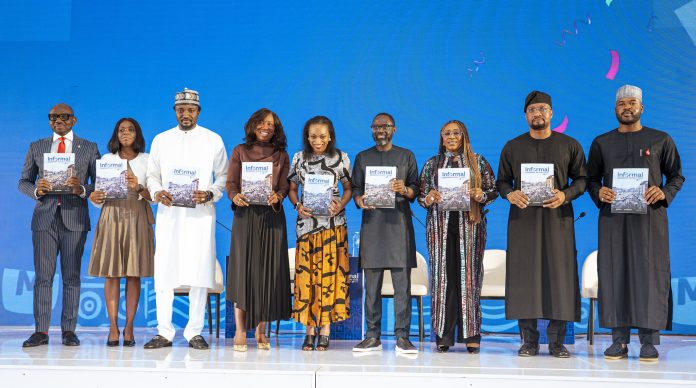The Group Chief Executive Officer of Moniepoint Inc, Tosin Eniolorunda, has called for deeper collaboration among the public and private sectors to unlock the vast potential of Nigeria’s informal economy — a sector that contributes significantly to the nation’s GDP yet remains largely under-supported.
Eniolorunda made this call last week during the public presentation of the second edition of the Nigerian Informal Economy Report, an initiative by Moniepoint designed to shed light on the dynamics, challenges, and opportunities within the country’s informal sector. The event convened some of the nation’s most influential policymakers, regulators, and private-sector leaders in what he described as “a powerful demonstration of what can happen when stakeholders work together for shared progress.”
“The conversations that followed reminded me just how powerful collaboration can be when government, regulators, and the private sector work toward a shared goal of unlocking the full potential of Nigeria’s informal economy,” Eniolorunda said.
“At Moniepoint, we remain committed to empowering small businesses and entrepreneurs with the tools, data, and access they need to thrive. We believe that when the informal economy thrives, Nigeria moves forward.”
High-Level Representation from Government and Industry
The event, held in Lagos, featured strong representation from the Presidency and other key national institutions, underscoring the growing recognition of the informal sector’s role in economic development.
The report was officially unveiled by Vice President Kashim Shettima, represented by Dr. Jumoke Oduwole, Honourable Minister of Industry, Trade and Investment. In her remarks, Dr. Oduwole emphasized the government’s ongoing commitment to creating policies that formalize and strengthen small-scale enterprises, which employ a majority of Nigeria’s workforce.
Other distinguished guests included:
- Hon. Ayodele Olawande, Minister of Youth Development (represented by Mrs. Ebiho Agun, Technical Adviser)
- Charles Odii, Director-General of the Small and Medium Enterprises Development Agency of Nigeria (SMEDAN)
- Ahmed Ningi, Senior Special Assistant to the President on Digital Media and Emergency Management (Office of the Vice President)
- Mohammed Bagudu, Special Adviser on Stakeholder Management and Finance, Federal Inland Revenue Service (FIRS)
- Uche Uzoebo, Managing Director and CEO, SANEF Limited
- Babatunde Olofin, Managing Director, Moniepoint MFB
- Temitola Adekunle-Johnson, Special Adviser to the President on Job Creation and MSMEs
- Akin Morakinyo, CEO, Chartered Institute of Bankers of Nigeria (CIBN)
- Edidiong Uwemakpan, Vice President, Corporate Affairs, Moniepoint Group
Each speaker shared insights on how data-driven policy, financial technology, and inclusive frameworks can help informal enterprises transition into more structured and sustainable operations.

The Significance of the Informal Economy
Nigeria’s informal economy — comprising traders, artisans, micro-enterprises, and self-employed individuals — is estimated to account for over 60% of the nation’s GDP and nearly 80% of its labor force, according to data from the National Bureau of Statistics (NBS).
However, many of these enterprises operate outside formal regulatory and financial systems, limiting their access to credit, insurance, training, and digital payment tools. The Moniepoint report seeks to bridge that knowledge gap by providing empirical data that can guide both policymakers and financial institutions in developing targeted interventions.
By examining the behavior, challenges, and aspirations of informal entrepreneurs, the report also aims to help financial service providers design more accessible products that meet the specific needs of small businesses.
“This report is not just research—it is a call to action,” Eniolorunda noted. “When we empower small businesses with the right tools and knowledge, we are directly investing in Nigeria’s prosperity.”
Moniepoint’s Role in Driving Financial Inclusion
Moniepoint, one of Nigeria’s fastest-growing financial technology companies, has built an extensive digital infrastructure that supports millions of small and medium-sized businesses across the country. Through Moniepoint Microfinance Bank and its digital payment ecosystem, the company provides affordable financial services, working capital, and digital tools that enable businesses to grow.
The launch of the second edition of the Informal Economy Report forms part of Moniepoint’s broader commitment to financial inclusion, entrepreneurial empowerment, and data-driven innovation in Africa’s evolving digital economy.
Eniolorunda reaffirmed that Moniepoint would continue to partner with both government and private sector stakeholders to create an environment where informal businesses can transition into the formal economy and fully participate in Nigeria’s digital transformation.
“When we talk about Nigeria’s future, we must talk about the informal economy,” he said. “Because it is in the informal markets, small shops, and micro-enterprises that the heartbeat of our economy truly resides.”




